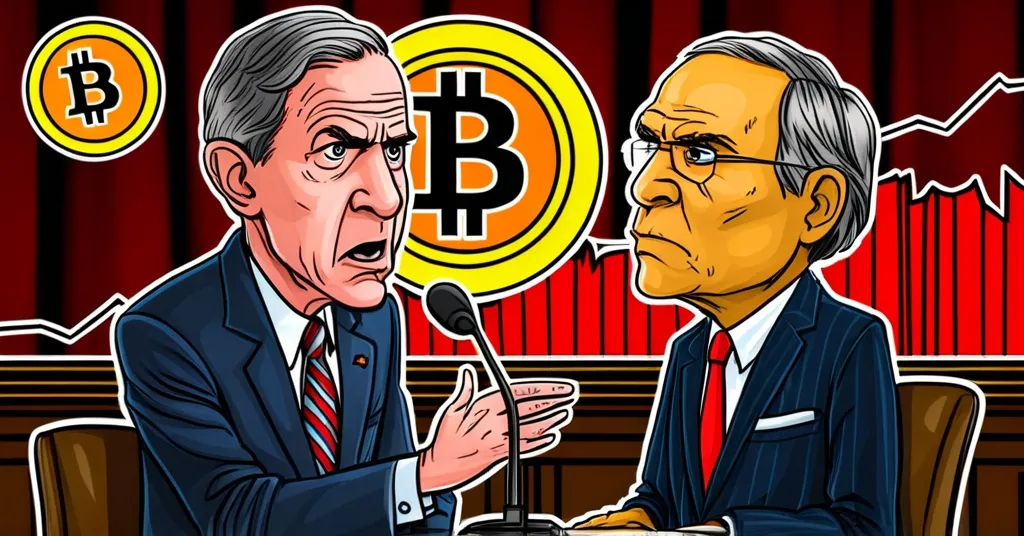Warren Challenges Treasury Nominee Bessent on Crypto Regulation and Financial Policies

Senator Elizabeth Warren Grills Treasury Nominee Bessent on Crypto Policy and More
Senator Elizabeth Warren isn’t pulling any punches. In a detailed 31-page letter, she’s challenging Scott Bessent, President Trump’s pick for Treasury Secretary, ahead of his confirmation hearing. Warren’s letter dives into Bessent’s Wall Street background and his potential impact on the U.S. financial system, focusing on his stance on cryptocurrency regulation, financial deregulation, tax policies, and the future of small banks.
- Warren challenges Bessent’s views on crypto oversight and financial deregulation.
- She questions his support for Trump-era tax cuts and their impact on the federal deficit.
- Warren highlights the decline of small banks and potential risks to financial stability.
Crypto Oversight Concerns
Warren is particularly concerned about Bessent’s views on crypto regulation. She probes whether the government’s financial watchdog, the Office of Foreign Assets Control (OFAC), should have the power to regulate stablecoins—cryptocurrencies pegged to stable assets like the U.S. dollar—and shut down risky crypto firms. “Do you think the Treasury should step in and address these gaps?” Warren asks, demanding answers on Bessent’s commitment to overseeing the rapidly growing crypto market.
In a market where Bitcoin is soaring at $97,265.00 and Ethereum stands at $3,240.69, the urgency of effective regulation becomes even more apparent. Yet, amidst this optimism, we must remain vigilant about the potential risks and ensure that the financial system remains stable and equitable. While Bitcoin maximalists might argue for minimal regulation, recognizing the disruptive potential of decentralized finance, we can’t ignore the necessity of safeguards to protect investors and maintain financial integrity.
Financial Deregulation Risks
But it’s not just about crypto. Warren also lambasts Bessent’s support for financial deregulation, linking it to past crises like the 2008 financial meltdown and the more recent 2023 collapse of Silicon Valley Bank (SVB). She argues that less government oversight of banks has led to increased instability, especially given the decline in small banks from 84% of all U.S. banks in 1994 to just 52% in 2022. “This isn’t a sandbox; it’s a system that hardworking Americans rely on,” Warren emphasizes, underscoring the real-world impact of financial policies.
It’s worth noting that while deregulation can stimulate innovation and growth, as proponents of effective accelerationism might argue, it also carries significant risks. Without proper oversight, the financial system becomes vulnerable to the very crises Warren warns against.
Tax Policy Critiques
Tax policy is another battleground. Warren challenges Bessent’s backing of Trump’s tax cuts, which added a staggering $4.5 trillion to the federal deficit without delivering on promises of economic growth. She questions his “3-3-3” plan to cut taxes, reduce the deficit, and boost growth, calling it unrealistic. “Do you really believe tax cuts pay for themselves?” she asks, highlighting the regressive nature of these policies that favor the wealthy.
The IRS budget is also under scrutiny. Warren opposes Republican efforts to slash $20 billion from the IRS, arguing it would hamper enforcement against wealthy tax evaders. “How do you plan to maintain audit quality without funding?” she queries, pushing for a robust tax enforcement system. This is crucial for ensuring tax fairness, a principle that resonates deeply with those advocating for decentralization and economic equity.
Protecting Small Banks
Warren highlights the alarming decline of small banks in the U.S., connecting this trend to increased financial instability. She demands to know Bessent’s plans to protect small businesses, which are the backbone of the American economy. “Can you assure us that small banks will have the support they need to thrive?” she asks, emphasizing the importance of a diverse banking landscape.
While large banks often dominate the financial narrative, small banks play a vital role in serving local communities and supporting niche industries. Their decline threatens not only financial stability but also the decentralized ethos of grassroots economic support.
As Bessent prepares for his confirmation hearing before the Senate Finance Committee, these questions will undoubtedly shape the discourse. Warren’s letter reflects a broader debate about the role of government in regulating financial markets, the impact of deregulation, and the need for fair tax policies. It’s a critical moment for those who believe in the transformative power of decentralized technologies and the importance of maintaining a balanced, equitable financial system.
Key Questions and Takeaways:
- What are Senator Warren’s main concerns regarding Scott Bessent’s nomination for Treasury Secretary?
Warren’s concerns include Bessent’s approach to crypto oversight, his support for financial deregulation, his tax policy plans, and his ability to protect small banks and ensure tax fairness.
- How does Senator Warren connect Bessent’s support for deregulation to past financial crises?
Warren links Bessent’s support for deregulation to the 2008 financial crisis and the 2023 collapse of Silicon Valley Bank, arguing that weakened regulations contributed to these events.
- What specific questions does Warren ask Bessent about crypto oversight?
Warren questions whether the Treasury’s Office of Foreign Assets Control (OFAC) should have jurisdiction over stablecoins and tools to shut down crypto firms that pose risks to the U.S. financial system.
- What are Warren’s criticisms of Bessent’s tax policy plans?
Warren criticizes Bessent’s support for Trump-era tax cuts, which added significantly to the federal deficit without achieving promised economic growth. She also questions his “3-3-3” plan for cutting taxes, reducing the deficit, and boosting growth, calling it unrealistic.
- How does Warren address the decline of small banks in the U.S.?
Warren highlights the decline of small banks from 84% of all U.S. banks in 1994 to 52% in 2022, connecting this trend to increased financial instability and questioning Bessent’s plans to protect small businesses.
- What is Warren’s stance on IRS budget cuts and their impact on tax enforcement?
Warren opposes Republican efforts to cut the IRS budget by $20 billion, arguing that such cuts would hinder enforcement against wealthy tax evaders and compromise audit quality.



